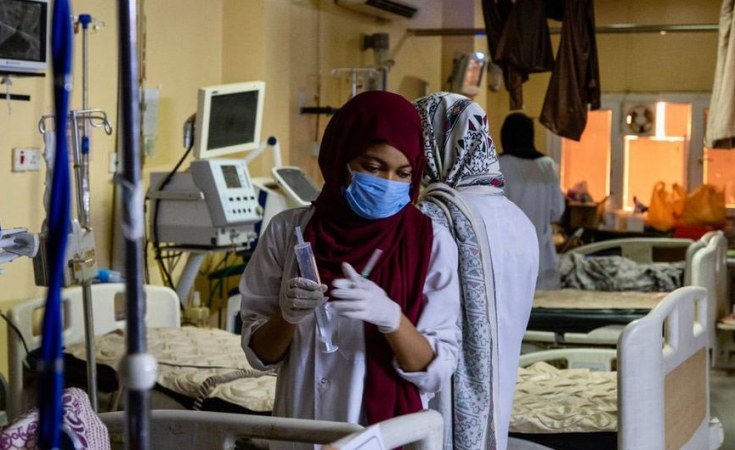The conflict in Sudan has sparked a health crisis for the 3.4 million people forced to flee to safety, whether within the country or across its borders, the World Health Organization (WHO) said on Thursday.
Cases of infectious diseases and other illness have been reported among the displaced population who have sought shelter in hard-to-reach locations, where health services are limited.
"The scale of the health crisis is enormous. We are working hard to step up our response, delivering critical medical and other emergency health supplies," said Dr. Nima Saeed Abid, WHO Representative in Sudan, speaking during a virtual press conference.
Crisis could worsen
WHO is one of many UN agencies that have been responding to meet the immense needs since war erupted in mid-April between the Sudanese army and the rival Rapid Support Forces (RSF) paramilitary organisation.
Last month, the agency issued an emergency appeal for $145 million to support its operations, which is only around 10 per cent funded.
With the health crisis affecting the entire region, and little hopes for peace, the fear is that things could worsen.
Health facilities attacked
The health situation in Sudan itself "has reached gravely serious levels", WHO said.
More than two-thirds of hospitals remain out of service amid increasing reports of attacks on health facilities. WHO has so far verified 51 attacks on health facilities, resulting in 10 deaths and 24 injuries - and cutting off access to urgently needed care.
"Although the attacks on health facilities and the widespread insecurity are compounding the challenges, we're determined to reach those most in need and urge for increased donor support to ensure that we deliver adequately," said Dr. Nima.
Supporting neighbouring countries
Nearly 760,000 people uprooted by the fighting have escaped to five neighbouring countries - Central African Republic (CAR), Chad, Egypt, Ethiopia and South Sudan - where WHO and partners are supporting national authorities to provide emergency health assistance to them.
Most refugees have headed to Chad, which is receiving an average of 2,500 arrivals daily. WHO and partners have identified and treated more than 1,400 trauma cases there, including over 60 major surgeries.
Some 70 per cent of trauma cases are due to gunshot wounds, while malaria, malnutrition and cholera infections are also being reported among the displaced.
'Huge pressure' in Chad
Chad alone is now hosting more than a quarter of a million people, with an equal number projected to arrive by the end of the year, said Dr. Jean-Bosco Ndihokubwayo, WHO Representative in the country.
"This will significantly increase the health needs and exert huge pressure on the available health facilities," he added.
WHO said cases of malaria among children under five, as well as suspected cases of yellow fever, have also been identified among the roughly 17,000 people who sought refuge in the CAR.
At breaking point in South Sudan
A suspected cholera outbreak has also been reported in locations in northern Ethiopia receiving large numbers of the displaced.
Meanwhile, the influx of more than 176,000 people into South Sudan has overstretched facilities in the northern Renk region where an upsurge of acute watery diarrhoea among under-fives is driving up mortality. A significant rise in cases of severe acute malnutrition and measles among these children has also been reported.
Swift aid response
WHO is working with partners to swiftly deliver emergency assistance in the face of the crisis.
Over 36 tonnes of supplies have been shipped to Chad and an emergency medical team has been deployed to the country. Emergency medical and non-medical supplies have also been delivered in the CAR, Egypt, Ethiopia and South Sudan.
In addition, disease surveillance is being stepped up to guide prevention and enable early detection of potential outbreaks, and national authorities are receiving technical support to strengthen the emergency health response.
WHO and partners are also supporting priority interventions that benefit the provision of basic health services, such as improving water and sanitation, carrying out vaccine drives, and strengthening infection prevention and control.


